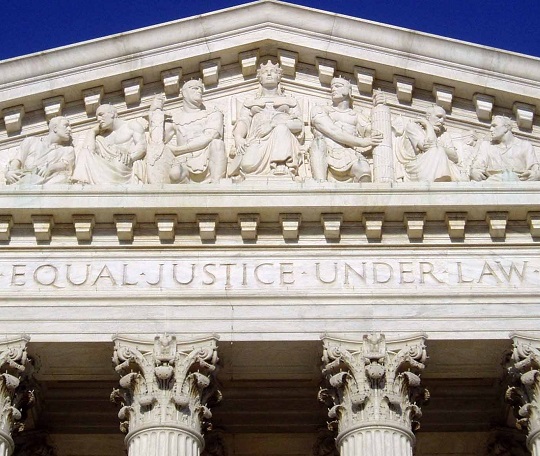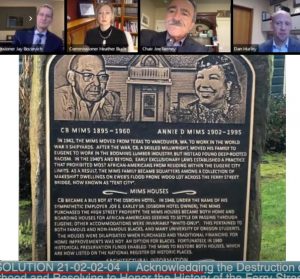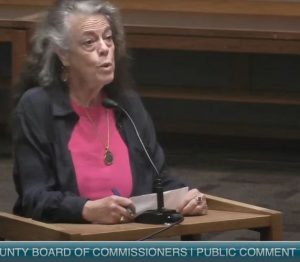We deserve equal justice under law, not political advocacy
4 min read
UpstateNYer, CC BY-SA 3.0 via Wikimedia Commons
by Marty Wilde
The U.S. Supreme Court’s recent activism should make us question the role of judges in public life. In the first days of law school, students learn that the function of judges is to interpret the law, just as it is the role of the legislature (and people) to make laws and the executive branch to enforce them. Recently, we have seen examples of judges who simply fail to follow the existing law, believing they know better. As public servants, judges have the duty to be reliable, to approach their work with appropriate humility, and to seek justice impartially.
Reliability. When I asked my wife what people would want to know about me as a judge, she immediately replied, “They want to know that you’re not crazy.” Reliability is important for that obvious reason – people deserve conscientious and thoughtful public servants and they want a functional court system that interprets the law consistently. We don’t fund enough courts in Oregon or the federal system. This means that many people who deserve a trial don’t get one in a timely manner. An effective judge shows up and works hard to make sure as many people as possible get a timely resolution of their cases.
Judges must also interpret the law the same way for similar sets of facts. This consistency also helps people resolve their disputes outside of court, because they know the likely outcome in court. It’s not the judge’s job to make the law, just to interpret it. The Supreme Court’s recent decisions should make us question whether the federal judicial system is failing in its basic duty of consistent results to serve the public, or whether it has just become another political branch of government.
Humility. Mark Twain once wrote “When I was a boy of fourteen, my father was so ignorant I could hardly stand to have the old man around. But when I got to be twenty-one, I was astonished at how much he had learned in seven years.” Indeed, as Twain implies, experience gives us a better, fairer perception of the world. I find that 47 years of life, 28 years of military service, 24 years of being a lawyer, 19 years of being a husband, and 16 years of being a father mostly help me remember how little I know and how much I have to learn. If we’re paying attention, experience should bring humility and appreciation that our own perspective is limited. Experience helps a judge see the limits of their own perspective and pay close attention to the facts and their meanings.
Equal Justice. The phrase, “Equal justice under law,” is engraved above the entrance to the US Supreme Court. I’ve served many places where those with power are the only people who can successfully access the courts and I’ve worked to change that. While the US justice system is far from perfect, it is our great strength that we aspire to achieve equal justice. As a legislator, I’ve endeavored to make sure the system works for everyone, from expanding access to legal assistance to insisting that we fulfill our constitutional obligation to ensure everyone accused of a crime has a lawyer. Perhaps most importantly, I’ve always demanded that the government itself must follow the law – a critical distinction between a dictatorship and a democracy. Justice is for everyone, not just the privileged few.
The public deserves judges that work hard, appreciate their limited role, and seek equal justice. While we elect state judges, they owe the public a duty of impartiality, not political advocacy. I hope we may return to that vision of public service in the judiciary.
You may notice that I avoid addressing specific hot topics in state politics lately. As a judicial candidate, I’m bound by the Code of Judicial Conduct (CJC). The CJC requires me to avoid making statements or commitments on issues that may come before the court. As the Circuit Court is one of general jurisdiction, I’m prohibited from making statements on a broad variety of topics. This is not to say that I don’t have opinions on the issues of the day, of course, but, were I to make a statement on them, I’d be prohibited from hearing a case on them in the future. Although I understand the reasons for the restriction, it makes it difficult to communicate with the voters.
Fortunately for the voters, my legislative record is clear on most issues. Judges are public servants. In my mind, that means they also have an obligation to communicate with the voters they work for. Rather than giving up on the column for the next few months, I’ve decided to refocus on issues of governance generally (like this week’s column) and issues that won’t come before the court.
Rep. Marty Wilde represents Oregon House District 11. Contact him by email at wildefororegon@gmail.com or through his legislative site, https://www.oregonlegislature.gov/wilde.






